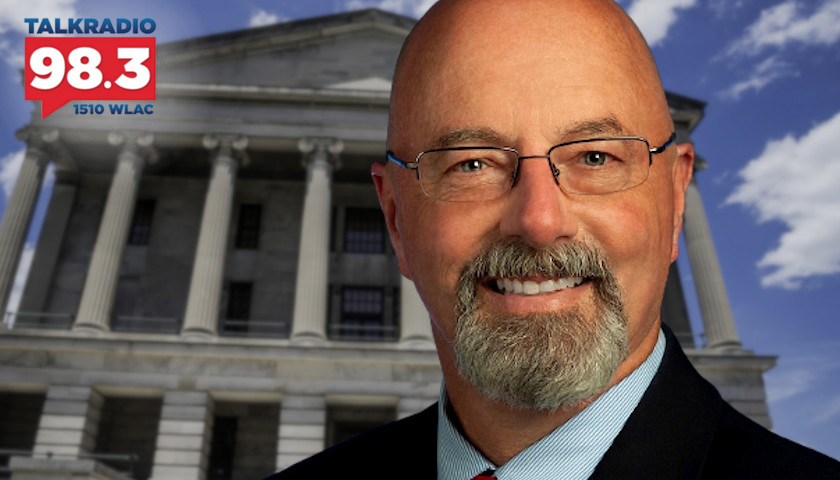Live from Music Row Monday morning on The Tennessee Star Report with Michael Patrick Leahy – broadcast on Nashville’s Talk Radio 98.3 and 1510 WLAC weekdays from 5:00 a.m. to 8:00 a.m. – host Leahy welcomed Tennessee State Senator (R-TN-09) Mike Bell in studio to discuss the continuation of Education Savings Account opportunities in Tennessee and parental choice.
Leahy: We are joined now on our newsmaker line by our very good friend, state Senator Mike Bell from Riceville. Senator Bell, good morning. How are you doing?
Bell: Hey, I’m doing well, Michael. How are you this morning?
Leahy: We’re doing great. Of course, the Tennessee General Assembly is in session. I salute you. The only blue collar member of the Tennessee State Senate.
(Bell laughs) I think the only blue collar member of the entire Tennessee General Assembly. Do I have that right? Are there others in the state House?
Bell: There are others in the House. In fact, in the House, there is another guy who makes his living pressure washing.
Leahy: Oh, that’s right. Clay Doggett
Bell: Clay Doggett. In fact, he and I are chairman and vice chairman of the Blue Collar Caucus.
Leahy: Yeah, I love that! Is there really a blue color caucus?
Bell: No, no, no. I’m just kidding. (Laughter)
Leahy: There should be one.
Bell: Yeah.
Leahy: It’s a little bittersweet for you. You were first elected in 2006 to the State House of Representatives and then in 2010 to the State Senate.
You announced in November that you will not be seeking reelection. This is going to be your very last session in the Tennessee General Assembly. What are your feelings about that?
Bell: I have mixed feelings. I love the work up here. I love most of the people up here that you work with. You get to have the opportunity to work and interact with great state employees and then other legislators who you become very close to.
But for me, in my time in life, it’s ready to move on to something else. And so I’m going to have very mixed feelings over the next several months until in November eighth when I’ll go out, I don’t know how to put it other than there are things I’m really going to miss and some things I’m not going to miss so much.
I could share a voicemail that I got last night that lasted, I think, about four and a half minutes, and there were probably 50 F bombs in that four and a half minute voicemail that was left on my phone.
Leahy: Was that a constituent or somebody from somewhere else?
Bell: Somebody from the state of Tennessee. They didn’t even identify where they were from.
Leahy: Right. So you said you like most of the people up there. Would you care to make a list of the people you don’t like? (Laughter)
Bell: No. No (Chuckles)
Leahy: In this session, what are your legislative priorities and what are the chances that your legislative priorities will be accomplished?
Bell: One issue has already made the news, and that is the expansion of ESA bills or ESA opportunities.
Leahy: Tell our listeners what ESA means.
Bell: Education Savings Account. The media likes to refer to them as vouchers because that gets the liberals a little more animated if you call it a voucher. But it’s an opportunity for parents to use their tax money.
It’s not the state’s tax money. It’s the people’s tax money to send their child to a school of choice. And again, the bill that I have came out of the Senate Education Committee last week, I think it’s going to be heard in the House Education Committee in the next week or two.
Representative Curcio has it. But it allows a parent whose child goes to a school district that school district refuses to offer 180 days of in person learning. It allows that parent to take that student and the money dedicated to that student and go to a school of their choice.
So if your child is going to school in Metro Davidson County, and Metro Davidson County refuses to offer 180 days of in person learning, which state law requires, then a parent would be able to take that money and send their child to a private school. It could be another public school in the area as well.
Leahy: At what time in the school year with the parent know this? In other words, do you know it like right now for this academic year?
Bell: No, you wouldn’t. And that’s one part of the discussion we got into last week in the Education Committee. There’s just no way for this to logistically work without completing a school year and then the ESA or the voucher being valid for the next school year.
So let’s say you had a school district this year and they end up having to miss or take a month off of in person learning. They have an opportunity to add those days at the end of the year.
So you’ve got to at least go to the end of the year to see if they will add those days back on to meet that 180 day requirement. Then if they don’t, the ESA would be good for next year.
Leahy: What would the amount of it be like $7,000 or something like that?
Bell: Yes. I think it’s $7,200.
Leahy: Now, what are the prospects that this bill will pass in the state Senate, then pass in the state House, then be signed into law by Governor Lee this session?
Bell: The state Senate, I believe we could pass it with relative ease. In the House, the House is a little different animal. It will be a little bit tougher to get passed over there. And in fact, that’s why I’m going to hold it.
I’ve got the bill out of Senate Education Committee. The next step is a floor vote and I’m going to hold it for floor vote to see what kind of momentum they can get going in the House before I move it to the Senate floor for a vote.
Leahy: Who’s sponsoring it in the House?
Bell: Michael Curcio from Dickson County.
Leahy: Okay. Do you have a lot of co-sponsors and what would the opposition be? What’s the opposition to this bill?
Bell: The opposition is just from teachers’ unions, the school board association, and the school Superintendent Association. They just don’t want any what they call public money going to private schools. Of course, I don’t call that public money. That’s not government money. That’s the people’s money.
Leahy: The usual suspects.
Bell: Yes. Oh, yes.
Leahy: (Chuckles) Now, what’s the prospect for this? There’s been all of these town hall meetings that Commissioner of Education Penny Swim has conducted, in essence, saying the money should follow the kid.
It looks to me like what they’re really looking for is more money for the schools. They’re redoing that Basic Education Plan, B-E-P, for funding schools. What do you see coming on the horizon on school funding overall?
Bell: Michael, you know, when you and I started out, you asked me this morning what I see as my biggest legislative priorities and I mentioned the ESA bill. But you’d ask me the question a little differently and if you’d ask me what I see the biggest issue facing the legislature is this.
This funding formula has been in place since the early 90s, and it is very complicated. Under the funding formula, there are winning counties and losing counties. In other words, there are some counties who right now probably get a little bit more than they should.
And there are some counties that probably get a little bit less than they should. And so this revamping of the funding is coming. The Governor Lee administration, I believe they have a plan. I think there’s probably some legislators who have seen it. I have not seen it yet.
I’ve been told the chairman of education in both the House and Senate, the chairman of finance in both the House and Senate have seen a proposed plan, or at least an outline of a proposed plan. I have not yet seen it.
It’s going to be a heavy lift because just as there’s winners and losers under the current plan, under any plan, there’s going to be counties again that are winners and losers. I am told that in the end it’s going to end up being more money going to our local school districts, but I know so little about it.
Leahy: Yes, it’s very complicated. It looks like that will play out. I have a last question for you. It’s a bit of a curveball. Are you ready?
Bell: Sure.
Leahy: Here it comes. Are you ready for a curveball? Here it is.
Bell: I hope so. (Laughs)
Leahy: Will you introduce a bill this year in the state Senate to tell the federal government to keep their 10 percent of education money so that they don’t have strings attached for the state government?
Bell: Oh, Michael, I probably won’t. We have had this discussion numerous times. And yes, I think it adds up to roughly 10 percent and in some districts it’s more.
We get much more money for students who are disabled. We get more money in low income areas from the federal government than we do in, say, Williamson County.
Leahy: So it’s unlikely that you will introduce that this year. But I keep asking everybody that. I think somebody will finally say yes, and then we’ll see what happens with that.
State Senator Mike Bell, congratulations on a fantastic career and we hope you enjoy the next few months you have as a state Senator. Thanks for joining us.
Bell: I appreciate it. You have a great day.
– – –
Tune in weekdays from 5:00 – 8:00 a.m. to the Tennessee Star Report with Michael Patrick Leahy on Talk Radio 98.3 FM WLAC 1510. Listen online at iHeart Radio.
Photo “Senator Mike Bell” by Senator Mike Bell.





